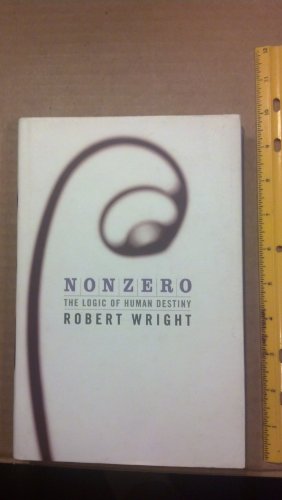Items related to Nonzero : The Logic of Human Destiny

"synopsis" may belong to another edition of this title.
The underlying reason that non-zero-sum games wind up being played well is the same in biological evolution as in cultural evolution. Whether you are a bunch of genes or a bunch of memes, if you're all in the same boat you'll tend to perish unless you are conducive to productive coordination.... Genetic evolution thus tends to create smoothly integrated organisms, and cultural evolution tends to create smoothly integrated groups of organisms.
Admittedly, it's as hard to think clearly about natural selection as it is to think about God, but that makes it just as important to acknowledge our biases and try to exclude them from our conclusions. It is this that makes Nonzero potentially unsatisfying to the scientifically literate. Time after time we've seen thinkers try to find in biological evolution a "drive toward complexity" that might explain all sorts of other phenomena from economics to spirituality. Some authors, like Teilhard de Chardin, have much to offer the careful reader who takes pains to read metaphorically. Others--legions of cranks--provide nothing but opaque diatribes culminating in often-bizarre assertions proven to nobody but the author. Wright is much closer to de Chardin along this axis; his anthropological scholarship is particularly noteworthy, and his grasp of world history is excellent. Unfortunately, he has the advocate's willingness to blind himself to disagreeable facts and to muddle over concepts whose clarity would be poisonous to his positions: try to pin him down on what he means by complexity, for example. Still, his thesis that human cultures are historically striving for cooperative, nonzero-sum situations is heartening and compelling; even though it's not supported by biology, it's not knocked down, either. If the reader can work around the undefined assumptions, Wright's charm and obvious interest in planetary survival make Nonzero a worthy read. If the first chapter's title--"The Ladder of Cultural Evolution"--makes you cringe, the last one--"You Call This a God?"--will make you smile. --Rob Lightner
-- Francis Fukuyama, Hirst Professor of Public Policy at George Mason University, Wilson Quarterly
"In Nonzero Wright investigates no less than the mystery of human destiny...This is grandiose stuff, but Wright's cosmology has been enriched by its new inclusiveness. Nonzero is a zealous and often thrilling gloss of all of human history--a work of philosophical derring-do from one of America's alpha minds."
-- Virginia Heffernan, Talk
"Wright's chapters on the evolution of biological complexity and intelligence -- in addition to being beautifully written and scientifically sound -- are a welcome corrective to current trendy views that understate natural selection's creative power. There is, indeed, as Darwin said, a grandeur in this view of life."
-- James Gould, professor of biology, Princeton University, and author of Biological Science
"In Nonzero, Robert Wright uses clear, often evocative language to explain and cooperation as driving forces in progressive evolution, and thereby the connection between biology and human history as illuminated by ongoing research."
-- Edward O. Wilson, professor of comparative zoology, Harvard University, and author of Consilience
"This is a truly provocative book...I recommend Nonzero to any and all readers as a marvelous summary and interpretation of what is now known and surmised about biological and human history on our planet. For an author so well informed scientifically, perhaps the book's most unusual feature is the fact that Wright does not flinch from closing with a chatty, informal yet incisive argument about cosmic meaning and purpose behind the story he unfolds...I greatly admire the book: wonder who Robert Wright may be who knows so much and has thought so clearly; and allows his imagination to range so freely."
-- William H. McNeill, author of Plagues and Peoples
"Evolution meets game theory in this upbeat follow-up to Wright's much-praised The Moral Animal....This book sends an important message that, as human beings make moral progress, history, in its broadest outlines, is getting better all the time."
-- Publishers Weekly
"This is the book to read to start off the millennium. Leaping from mountaintop to mountaintop, this integrative and inspiring volume is brimming with hope for a positive human future. Religions are made of such stuff."
-- Martin Seligman, professor of psychology, University of Pennsylvania, and author of Learned Optimism
"About this title" may belong to another edition of this title.
- PublisherPantheon Books
- Publication date2000
- ISBN 10 0316644854
- ISBN 13 9780316644853
- BindingPaperback
- Edition number1
- Rating
Buy New
Learn more about this copy
Shipping:
US$ 5.31
Within U.S.A.
Top Search Results from the AbeBooks Marketplace
NONZERO : THE LOGIC OF HUMAN DES
Book Description Condition: New. New. In shrink wrap. Looks like an interesting title! 1.59. Seller Inventory # Q-0316644854

